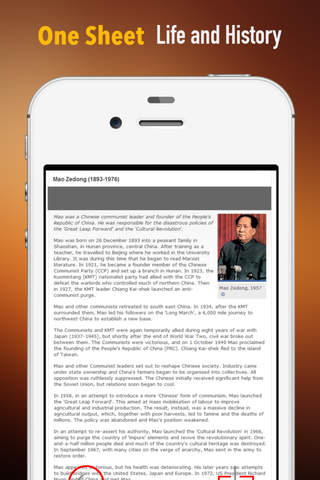
Mao Zedong Biography and Quotes: Life with Documentary and Speech Video app for iPhone and iPad
Developer: ZiHow Workshop
First release : 27 Jun 2016
App size: 98.15 Mb
Want to learn All about Mao Zedong biography, his famous quotes and speeches, and to watch his documentary all in one App? This is for you.
Features:
- Visualized history and biography, for easy learning and reference
- Famous Quotes to get inspiration
- Documentary or speeches to bring you virtually back to the history
- Having everything about Mao Zedong in one App.
Brief Introduction of Mao Zedong:
Mao Zedong ( also transliterated as Mao Tse-tung and commonly referred to as Chairman Mao (December 26, 1893 – September 9, 1976), was a Chinese communist revolutionary and founding father of thePeoples Republic of China, which he ruled as an autocrat styled the Chairman of the Communist Party of China from its establishment in 1949, until his death in 1976. His Marxist–Leninist theories, military strategies, and political policies are collectively known as Maoism or Marxism-Leninism-Maoism.
Born the son of a wealthy farmer in Shaoshan, Hunan, Mao adopted a Chinese nationalist and anti-imperialist outlook in early life, particularly influenced by the events of the Xinhai Revolution of 1911 and May Fourth Movement of 1919. Mao adopted Marxism–Leninism while working at Peking University and became a founding member of the Communist Party of China(CPC), leading the Autumn Harvest Uprising in 1927. During the Chinese Civil War between the Guomindang (GMD) and the CPC, Mao helped to found the Red Army, led the Jiangxi Soviets radical land policies and ultimately became head of the CPC during the Long March. Although the CPC temporarily allied with the GMD under the United Front during the Second Sino-Japanese War(1937–45), after Japans defeat Chinas civil war resumed and in 1949 Maos forces defeated the Nationalists who withdrew to Taiwan.
On October 1, 1949, Mao proclaimed the foundation of the Peoples Republic of China (PRC), a Communist Party dictatorship controlled by the CPC. In the following years Mao solidified his control through land reform campaigns against landlords, and perceived enemies of the state he termed as "counter-revolutionaries". In 1957, he launched the Great Leap Forward campaign that aimed to rapidly transform Chinas economy from an agrarian economy to anindustrial one. The campaign led to a widespread famine, whose death toll is estimated at between 18 and 45 million. In 1966, he initiated the Great Proletarian Cultural Revolution, a program to remove "counter-revolutionary" elements of Chinese society that lasted 10 years and which was marked by violent class struggle, widespread destruction of cultural artifacts and unprecedented elevation of Maos personality cult. In 1972, Mao welcomed American President Richard Nixon in Beijing, signalling a policy of opening China, which was furthered under the rule of Deng Xiaoping (1978–1992). Mao suffered a series of heart attacks in 1976, dying in that September, aged 82. He was succeeded as Paramount Leader by Hua Guofeng (1976–1978), who was quickly sidelined and replaced by Deng.
We look forward your feedback and comment to improve your experience with this application.



